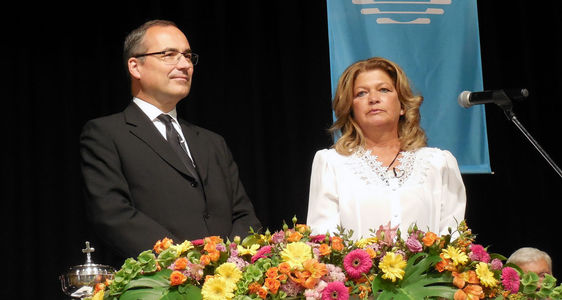Laying the foundation on the rock
Building our house of faith on rock is an image we are all familiar with. But what does it really mean? Chief Apostle Jean-Luc Schneider provided some new impulses in a recent divine service in Hungary.

“Whoever comes to Me, and hears My sayings and does them, I will show you whom he is like: He is like a man building a house, who dug deep and laid the foundation on the rock. And when the flood arose, the stream beat vehemently against that house, and could not shake it, for it was founded on the rock” (Luke 6: 47–48). This was the Bible text the Chief Apostle used in the divine service on 20 June 2015 in Budapest, the capital of Hungary.
The rock is Jesus Christ
“Everybody has to build their house of faith,” the Chief Apostle said. “The building consists of the following: What are you doing with your life and with your faith; how do you feel about God? In the imagery used in the Bible, the rock is often used to symbolize the Son of God, the Saviour. “The rock is something that is strong, hard, and immobile: Jesus Christ.”
The water and the storm have a dual meaning. They are “an image for the hardships and evil, for the trials and afflictions that every person faces. But the water is also an image for the judgement of God.” On the day that Christ returns, it will be decided whether we are worthy or not to partake in the day of the Lord. Everyone who does not take part, will be assessed at the time of the Last Judgement whether they can enter the new creation or not.
When faith becomes a mere habit
“It all depends on how someone builds his house of faith whether it is going to stand before God or not,” Chief Apostle Schneider said with reference to the words of Jesus, “Whoever comes to Me, and hears My sayings and does them.” A “faith that is practised out of mere habit—attending the divine services regularly, praying, and bringing offerings—is not enough to be justified before God. We have to do more. We have to act in accordance with our faith and practise the gospel that is preached.”
The Chief Apostle took the standards for the way we should practise our faith from the Sermon on the Mount found in Matthew and from its counterpart in Luke, the Sermon on the Plain, to which the Bible text belongs.
- “And just as you want men to do to you, you also do to them likewise” (Luke 6: 31). “We hear the word, we believe it, but do we practise what we hear and believe?” the Chief Apostle asked. “Do we speak with our neighbour the way we would want him to speak with us? And when we talk about him, do we do it the way we would like him to talk about us?”
- “First remove the plank from your own eye, and then you will see clearly to remove the speck that is in your brother’s eye!” (Luke 6: 42). “Do we really do that? If we are honest, not always.”
- Those who want God to forgive them have to forgive their neighbour (cf. Matthew 6: 14–15). “We know and believe that, but do we follow up on it?”
“Of course we are all imperfect. Nobody can say that he or she fulfils the precepts set by the gospel one hundred per cent,” Chief Apostle Schneider said. “God knows that. But He wants to see whether we are sincere about our efforts to act in accordance with it. When He sees that our efforts are serious, He will grant us His grace.”
Digging deep enough
Finally, the Chief Apostle elaborated on the word “deep” in the Bible text. “What is important is that our faith is firmly grounded and its foundation laid on the rock, Jesus Christ.” There are believers, he said, who build on Jesus Christ, but do not dig deep enough. “There is still a layer of soil between their house and the rock. They follow the gospel because they expect something in return.” They hope, “If we are faithful, God will preserve us from evil and will make our earthly lives pleasant and comfortable.” This will work for a while until, one day, they have to face a big test. “Their disappointment is so great that their faith just collapses.”
“Let us dig deep. We want to lay our foundation directly on the rock, Jesus Christ,” Chief Apostle Schneider appealed. “We do not see His word and His law as a set of rules that we have to follow so that things go well for us. We recognize His love in His word and the law. And because His love is so great, we love Him. And because we love Him, we keep His commandments. The motivation here is completely different.”
“That is a wonderful and strong link with the rock Jesus Christ,” the Chief Apostle concluded. “When I am disappointed by life and things are hard, I suffer, but I do not disconnect myself from Jesus Christ. I know that His love for me will not change, and my love for Him will not change. Let us build our faith directly on the rock that is Jesus Christ. Then we will be justified before God.”
Article info
Author:
Date:
Keywords:
Andreas Rother
09.07.2015
Chief Apostle,
Divine service,
Hungary




